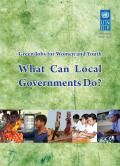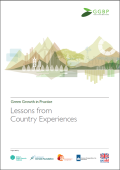This guideline provides practical tools for city planners and decision makers to reform urban planning and infrastructure design according to the principles of eco-efficiency and social inclusiveness. It includes case studies from the Republic of Korea, the Philippines, Japan and Sri Lanka.

This paper presents examples of policies and programmes initiated by local governments that promote green jobs especially for women and youth. The aim is to inspire more local governments to consider policies that address the economic, social and environmental dimensions of sustainable development. The report includes case studies from South Africa, the Phillippines, Senegal, Bolivia, Argentina, Colombia, Bangladesh, Zimbabwe, Lesotho, Burundi and Viet Nam.
This report investigates how cities can use different instruments to integrate the environment into urban planning and management approaches. Including: policy instruments, process instruments, planning instruments and management instruments. The report examines how these instruments are applied to several well established approaches to integrated urban planning. It examines the characteristics, strengths and weaknesses of Integrated Development Plans, City Development Strategies, ecoCity Planning, ecoBUDGET and Strategic Environmental Assessment.
The report also includes 12 case studies of cities that have worked to integrate the environment into their planning processes including: Egypt (Alexandria), Thailand (Bangkok), Republic of Cuba (Bayamo), the Philippines (Bohol), Bulgaria (Bourgas), Canada (Calgary), South Africa (Cape Town), Brazil (Goiânia; Porto Alegre), Columbia (Manizales), Kenya (Nakuru), and the People’s Republic of China (Yangzhou).

Green growth is becoming an attractive opportunity for countries around the world to achieve poverty reduction, environmental protection, resource efficiency and economic growth in an integrated way. Green growth strategies generate policies and programs that deliver these goals simultaneously. They accelerate investment in resource efficient technologies and new industries, while managing costs and risks to domestic taxpayers, businesses, communities and consumers.
This report carried out by the Green Growth Best Practice (GGBP) initiative, is the first comprehensive international assessment of lessons from experiences of pursuing green growth across all levels of government and all regions. The report is the result of a collaborative partnership between the Climate & Development Knowledge Network (CDKN), the European Climate Foundation (ECF) and the Global Green Growth Institute (GGGI). It engaged 75 authors in evaluating more than 60 programs around the world.
Climate-related disasters have inflicted increasingly high losses on developing countries, and with climate change, these losses are likely to worsen. Improving country resilience against climate risks is therefore vital for achieving poverty reduction and economic development goals.
This report discusses the current state of knowledge on how to build climate resilience in developing countries. It argues that climate-resilient development requires moving beyond the climate-proofing of existing development pathways, to consider economic development objectives and resilience priorities in parallel. Achieving this will require political vision and a clear understanding of the relation between climate and development, as well as an adapted institutional set-up, financing arrangements, and progress monitoring and evaluation. The report also discusses two priorities for climate-resilient development: disaster risk management and the involvement of the private sector.
